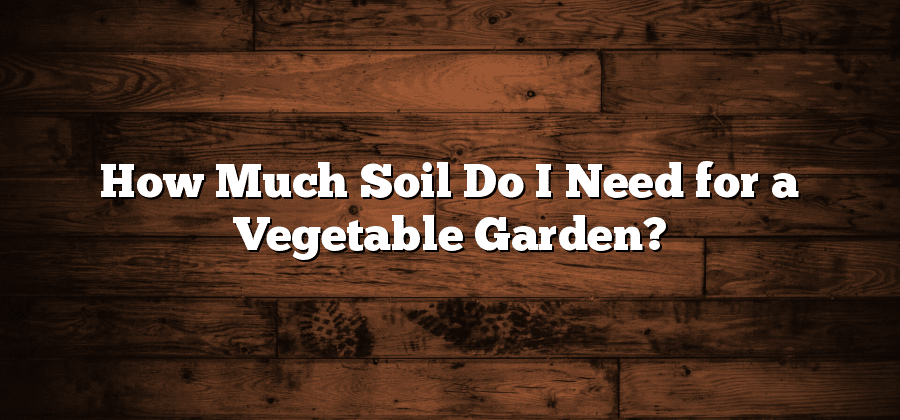Understanding the Soil Requirements for Your Vegetable Garden
When it comes to creating a successful vegetable garden, understanding the soil requirements is absolutely essential. The quality and composition of the soil directly influence the health and productivity of your plants. Different vegetables have different needs, so it is crucial to tailor your soil to suit the specific plants you wish to grow.
One key factor to consider is the pH level of the soil. Most vegetables thrive in slightly acidic to neutral soil, with a pH between 6.0 and 7.0. Conducting a soil test can provide valuable insights into the current pH level and any necessary adjustments that need to be made. Additionally, the soil’s texture plays a vital role in providing proper anchorage for the roots and allowing water and nutrients to penetrate effectively. Sandy loam soils with good drainage are generally preferred for vegetable gardens, as they offer a balance between water retention and aeration.
Assessing the Dimensions and Area of Your Garden
To ensure a successful vegetable garden, it is crucial to accurately assess the dimensions and area of your garden. This step is fundamental in order to plan and optimize your planting bed layout, decide on the number of plants you can accommodate, and determine the spacing between them. By knowing the dimensions of your garden, you can make informed decisions about the types and quantities of vegetables you can grow.
To assess the dimensions and area of your garden, start by measuring the length and width of the available space. Use a tape measure or a measuring wheel to get precise measurements. It is important to measure from the outside edges of the garden and not just the planting area. This will provide a comprehensive understanding of the total space you have to work with. Once you have the dimensions, multiply the length by the width to calculate the total area. This will give you a clear idea of how much space you have available for planting and will be essential for the subsequent steps in planning your vegetable garden.
Determining the Ideal Depth of Soil for Vegetable Growth
The ideal depth of soil for vegetable growth is a critical factor to consider when setting up your vegetable garden. The depth of the soil determines the root development and overall health of your plants. Generally, a depth of 12 to 18 inches is recommended for most vegetables. This provides enough space for the roots to establish themselves and access water and nutrients. However, some vegetables, like carrots and parsnips, may require deeper soil, up to 24 inches, to accommodate their taproots.
When determining the ideal depth of soil for your vegetable garden, consider the specific needs of the plants you intend to grow. Leafy greens, such as lettuce and spinach, have shallower roots and can thrive in shallower soil depths. On the other hand, root vegetables like potatoes and radishes require deeper soil to support their growth. It is important to research the specific requirements of each vegetable you wish to grow to ensure you provide the appropriate soil depth for optimal growth and yield. Additionally, be mindful of any existing soil limitations, such as rocky or compacted soil, as this may affect the depth you are able to achieve for your vegetable garden.
Considering Soil Amendments and Nutrient Requirements
Soil amendments and nutrient requirements play a crucial role in ensuring the success of your vegetable garden. It is important to understand the specific needs of your plants and make necessary adjustments to promote healthy growth and maximum yields.
When considering soil amendments, it is essential to assess the existing soil composition and address any deficiencies or imbalances. Adding organic matter, such as compost or well-rotted manure, can improve soil structure, enhance drainage, and increase the availability of essential nutrients. Additionally, incorporating organic matter into the soil can serve as a long-term source of nutrients, gradually releasing them to the plants over time. Regular soil testing can also provide valuable insights into nutrient levels, allowing you to tailor amendments to the specific requirements of your vegetable garden.
Alongside soil amendments, understanding nutrient requirements is key for maintaining optimal plant health. Different vegetables have varying nutrient preferences, and it is crucial to provide them with the necessary elements for growth. Nitrogen, phosphorus, and potassium (NPK) are the three primary macronutrients that plants need in relatively large quantities. However, micronutrients such as iron, zinc, and manganese are equally important, although they are required in smaller amounts. Balancing these nutrients and addressing any deficiencies through proper fertilization is essential to promote healthy plant growth, vigorous production, and overall garden success.
In conclusion, considering soil amendments and nutrient requirements is crucial to ensure the optimal growth and productivity of your vegetable garden. By addressing soil deficiencies, incorporating organic matter, and providing the right balance of macronutrients and micronutrients, you can create an environment that promotes healthy plant growth and maximizes your harvest.
Calculating the Soil Volume Needed for Raised Beds
To ensure the success of your vegetable garden in raised beds, it is essential to determine the correct amount of soil volume needed. Calculating the soil volume required for your raised beds is a straightforward process that involves a few basic measurements.
First, measure the length, width, and height of each raised bed. Multiply these dimensions together to calculate the volume of each individual bed. For example, if your raised bed is 4 feet long, 3 feet wide, and 1 foot high, the volume would be 4 x 3 x 1 = 12 cubic feet.
Next, add together the volume of all the raised beds in your garden to determine the total soil volume needed. This will give you a clear idea of how much soil to purchase or prepare. By accurately calculating the soil volume required, you can ensure that your raised beds have enough space for proper root growth and nutrient availability, setting the stage for a productive and thriving vegetable garden.






